 MyCatBreeds
MyCatBreeds Maine Coon is originated from United States but European Burmese is originated from Myanmar. Both Maine Coon and European Burmese are having almost same weight. Both Maine Coon and European Burmese has almost same life span. Both Maine Coon and European Burmese has same litter size. Maine Coon requires Moderate maintenance. But European Burmese requires Low maintenance
Maine Coon is originated from United States but European Burmese is originated from Myanmar. Both Maine Coon and European Burmese are having almost same weight. Both Maine Coon and European Burmese has almost same life span. Both Maine Coon and European Burmese has same litter size. Maine Coon requires Moderate maintenance. But European Burmese requires Low maintenance
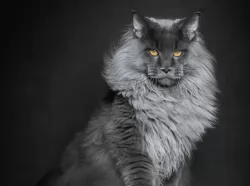 The Maine Coon cat hails from Maine, USA. It’s a natural cat breed with actually little being known of its exact origins.
The Maine Coon cat hails from Maine, USA. It’s a natural cat breed with actually little being known of its exact origins.
In fact, the first reference to the cat seems to have been in about 1861. It was in 1895 that a female Maine Coon was named Best Cat at a cat show held in Madison Square Gardens.
The Cat Fanciers Association was formed in 1908, and the 5th cat registered as a Maine Coon named Molly Bond.
The Maine Coon Breeders and Fanciers Association was formed in 1968. The cat is also the official state cat of Maine.
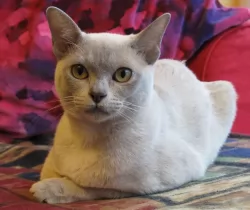 The European Burmese was developed in the 1960s when they were imported to England by British breeders.
The European Burmese was developed in the 1960s when they were imported to England by British breeders.
They were then crossed with red-point Siamese as well as British Shorthairs to expand the gene pool and number of coat colors.
In 1994, the cat was recognized by the Cat Fanciers Association and later by the Canadian Cat Association as well as the Cat Fanciers Federation and others as well.
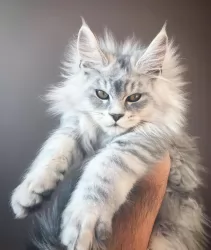 This is a large cat breed with strong bone structure. They can weigh between 5 and 9kg.
This is a large cat breed with strong bone structure. They can weigh between 5 and 9kg.
The height of these cats can be in the region of 25 and 41cm and they can reach a length of 97cm, including the tail. The body is muscular and robust with the chest being broad.
When it comes to the cat’s coat, the Maine Coon is characterized by the ruff along its chest. It has a 3-layered, water-resistant coat with longer hairs over a silky undercoat, and a long, bushy tail. The color of the coat can vary but the most common color is brown tabby. . It is medium- to long-haired. It’s a seasonal shedder with the fur being considerably thicker in the winter. All colors are available in this cat except blue.
The Maine Coon is a sociable cat and known for it playfulness as well as it being an intelligent cat and easy to train.
You’ll certainly need to supply the cat with some puzzle toys so as to stimulate his brain. It is also one of these cats known to have dog-like characteristics, becoming attached to its human owners, and being good-natured.
It is a loving cat and is also fairly vocal, wanting to tell its human owners what it wants. It’s not a lap cat. It is a gentle cat and gets on well with children and dogs as well as other cats.
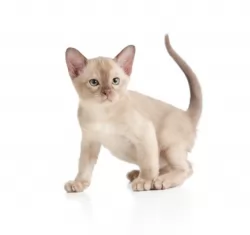 Your beautiful European Burmese cat is a small to medium-sized cat and both males and females will weigh between 3 and 5kg.
Your beautiful European Burmese cat is a small to medium-sized cat and both males and females will weigh between 3 and 5kg.
The cat’s coat is short and glossy and it comes in a number of different colors such as white, brown, cream, blue, red and tortoisehell.The cat has large, expressive eyes that are a yellow or amber shade.
Your European Burmese has a silky short coat and the coat will also only need to be brushed once a week to keep it in tip-top condition.
The European Burmese is a very affectionate, loyal ad intelligent cat, loving the companionhip they share with their human family.
They’re a great pet for families as they’re active and playful. They are also a cat breed that likes to bond with one particular family member more than others.
They’re also inclined to be lap cats, grabbing each opportunity to be stroked and petted. They will also be quite willing to become friends with other pets in the home and don’t like to be left alone for a long time.
They like having other pets around to keep them company and can become withdrawn if constantly left on their own.
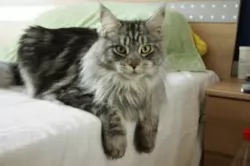 Maine Coon cats are such awesome pets and highly entertaining. They're excellent climbers too and to add to their many amazing characteristics, they love playing in water too.
Maine Coon cats are such awesome pets and highly entertaining. They're excellent climbers too and to add to their many amazing characteristics, they love playing in water too.
You’ll be doing him a favor by providing him with a paddling pool. They’re so clever, they may even learn to turn a tap on.
He is such a social, friendly, family-loving cat and it's not surprising that he’s a firm favorite with most cat lovers.
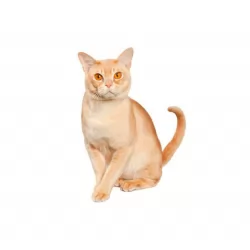 Your European Burmese has a sweet disposition and it is a loving, companionable cat. They enjoy the company of their human owners as well as other pets.
Your European Burmese has a sweet disposition and it is a loving, companionable cat. They enjoy the company of their human owners as well as other pets.
They can be quite vocal too and they don’t like being left alone. If you work all day, it will be a good idea to have another pet as a companion for the European Burmese.
The European Burmese loves to play and is a fun-loving, active, social cat. While they love their human family, they may not make the greatest pet for an inactive, single person as these cats actually seek out companionship.
A person unable to involve themselves with this cat, may well find it becoming depressed. These are cats that require a lot of interaction and attention, craving the attention of their human families.
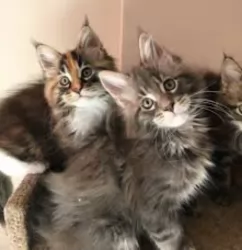 There are certain health problems that seem to occur in this particular cat breed, including hip dysplasia and feline hypertrophic cardiomyopathy.
There are certain health problems that seem to occur in this particular cat breed, including hip dysplasia and feline hypertrophic cardiomyopathy.
Hip dysplasia is a condition of the hip joint that can cause degeneration of the joints. It can lead to stiffness and pain for your cat and it can be that your cat develops osteoarthritis.
If your cat develops hip dysplasia it won’t want to jump, it becomes lethargic and there may even be muscle loss in the rear legs.
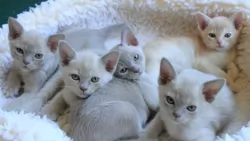 The European Burmese is a fairly healthy cat and is unlikely to cost you a lot in terms of vets fees.
The European Burmese is a fairly healthy cat and is unlikely to cost you a lot in terms of vets fees.
Just like with other cats, some of the common cat illnesses include developing diabetes mellitus. There have been some of these cats that ave been known to suffer from Feline Orofacial Pain Syndrome (FOPS).
It is a disease related to the teeth. Teeth problems are a common ailment with cats. With this particular problem, there is an unusual amount of pain when the cat's adult teeth begin to emerge. Your cat will be displaying a lot of licking and chewing motions. The symptoms do however go away once the adult teeth come in.
The cat will in all likelihood need to see the vet for pain medication and other treatments such as a potassium supplement.
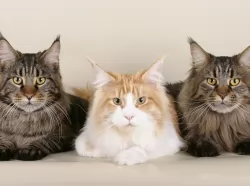 Cat owners need to realize that diet is one of the most important factors of keeping a cat healthy. The Maine Coon needs nutritious food.
Cat owners need to realize that diet is one of the most important factors of keeping a cat healthy. The Maine Coon needs nutritious food.
Some people give their cat a mix of dry kibble as well as wet food. It is better to feed your pet smaller meals as opposed to large meals. What is very important is that the cat food is of a high-quality and that it be made up of meaty protein as every cat is a carnivore.
Provide your Maine Coon with a litter box and put it in a quiet, private area. It’s a large cat so make sure the litter box is large as well. With a cat you may need to experiment with him to figure out where he prefers his litter box to be.
This is an active cat so ensure that he gets plenty of exercise. Provide him with climbing equipment and stimulating toys. Your Maine Coon might even enjoy going for a walk and for this, you’ll need to get a cat harness.
Every cat likes to scratch – it’s normal behavior. Make sure you have one or two scratching posts with heavy bases set up for your cat otherwise he may direct his scratching on your furniture.
Every cat owner needs to know a good vet in their area so that their pet can get immediate veterinary help when he becomes sick.
Your Maine Coon’s coat is thick – made up of 3 layers. To maintain its silky feel, and to prevent matting, make sure to brush it once or twice a week. Make it an enjoyable, gentle grooming session for your furry pet. Speak to your vet about the right kind of brushes.
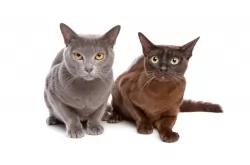 Because the European Burmese is a very affectionate, loyal cat, and because they thrive on the companionship of their human family, you owe it to him to provide him with consistent companionship. They are friendly cats and will be amicable to visitors to the home too.
Because the European Burmese is a very affectionate, loyal cat, and because they thrive on the companionship of their human family, you owe it to him to provide him with consistent companionship. They are friendly cats and will be amicable to visitors to the home too.
Scratching is a natural behavior of pets so instead of becoming angry with your cat when he scratches on your furniture, provide him with a scratching post.
You can also learn how to carefully clip your cat's nails, otherwise a professional cat groomer can do it for you.
It’s not always easy keeping a cat indoors and that is why neutering or spaying becomes important to avoid unwanted kittens. It makes your European Burmese a more balanced cat and it has a host of health benefits too.
It can’t be stressed enough how important good food is for the health of people and animals. The European Burmese needs top quality food high in proteins and meat to remain healthy.
If you feed your cat human food or food high in carbs, expect to spend a lot on vet fees.
Make sure your pet enjoys his food but that it is also nutritious and in the right portions to avoid obesity.
Kittens will eat 4 bowls of food a day and then progress to 2 bowls of food after the cat turns one year of age.